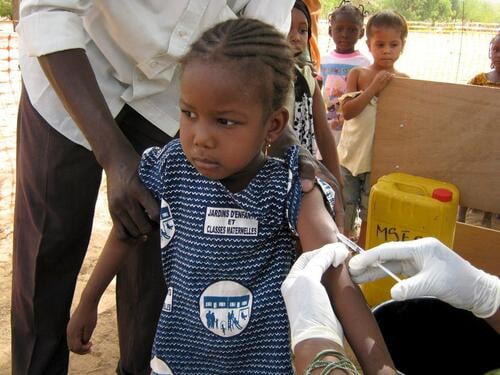Paris/Brussels, 6th December 2010 —A promising new vaccine that could prevent future outbreaks of the deadliest form of meningitis in Africa will be provided to people in Mali and Niger this month with the support of international medical organisation Médecins Sans Frontières (MSF). The vaccination campaign against meningococcal Meningitis A is being carried out in collaboration with health authorities in both countries.
“This vaccine could effectively prevent new outbreaks of Meningitis A in the future,” said Florence Fermon, MSF’s vaccination policy advisor. “But for the impact to really be felt, there needs to be a plan to roll out the new vaccine sufficiently in the 25 African countries that are most at risk of epidemics.”

MSF’s efforts are part of a larger vaccination campaign led by the Ministries of Health in Niger, Mali and Burkina Faso and the WHO. MSF is planning to provide support to the Ministry of Health in Niger in vaccinating 600,000 people between the ages of one and 29 in the Dosso and Boboye districts. In Mali, MSF teams will vaccinate 800,000 people in the Koulikoro, Kati and Kangaba districts.
For years, MSF has been mounting emergency responses to outbreaks in Africa’s ‘meningitis belt’, an area stretching from Senegal to Ethiopia which is regularly hit by epidemics - in 2009, MSF vaccinated more than seven million people for Meningitis A. But the polysaccharide vaccine that has been available until now offered protection for only up to three years, which limited MSF’s response to trying to slow and stop an epidemic once it was under way.
“There are big benefits with this vaccine: protection can last for 10 years which means we can vaccinate people before epidemics hit and actually prevent the epidemics” said Florence Fermon. “Also, it can be used for children under the age of two years. But most importantly, there are wider benefits: the vaccine will stop transmission of the bacteria within a population by eliminating the carriage of the germ. It means that people who are vaccinated will not pass on the bacteria to those who are not.”
But challenges remain - the funds to vaccinate people in the other 22 countries across the meningitis belt have yet to be identified, and a phased plan for rolling out the vaccine also needs to be developed.
“Thanks to an innovative way of doing research and development where the need for an affordable product was factored in from the very start, this vaccine costs only 40 US cents per dose” said Dr Tido von Schoen-Angerer, Director of MSF's Access Campaign.
“But despite its low price, no donor has yet come forward to offer financial support to implement the vaccine beyond the first three countries. National authorities should receive the necessary support to vaccinate in sufficient numbers. Also, it has to be ensured that when children turn one year of age, they receive this vaccine as a part of routine immunisation activities. We can not afford to miss the opportunity to tackle such a deadly disease.”


